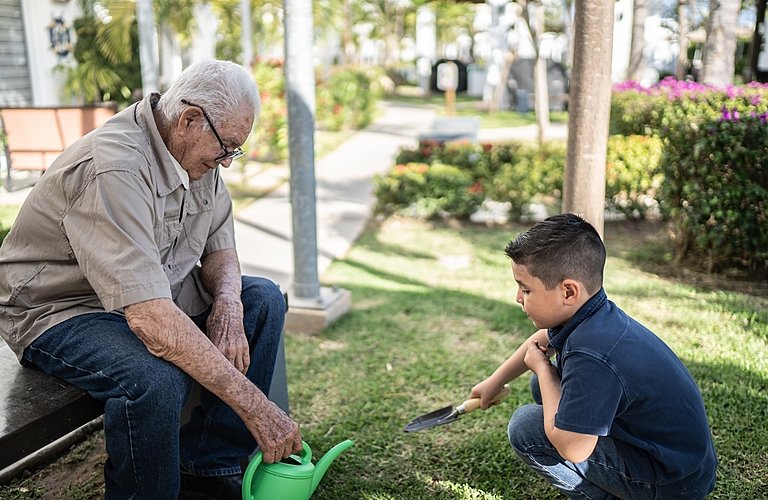192 Sloane Street, London SW1X 9QX

Is It Possible to Provide Dementia Care at Home?
Caring for someone living with dementia presents unique difficulties that touch every aspect of daily life. From managing daily routines to ensuring safety, families face complex decisions whilst navigating the emotional journey of supporting a loved one through cognitive decline. The question of where care should be provided often weighs heavily on families' minds. Below, we explore the realities of home-based dementia care, the support available, and how to determine when alternative care arrangements might be necessary.
What Does Dementia Care at Home Involve?
Providing dementia care at home encompasses far more than meeting basic physical needs. It requires a comprehensive approach that addresses the cognitive, emotional and social aspects of the condition. Family and friends can be a great source of informal support, offering practical help such as sitting with the person living with dementia, or taking them out shopping, to a café or for an activity, so you have some time to yourself. Home-based dementia care typically involves establishing consistent daily routines that provide structure and familiarity. This includes assistance with personal care tasks like washing, dressing and medication management. Creating a safe environment becomes paramount, often requiring modifications such as removing trip hazards, installing grab rails and improving lighting throughout the home.
Can Professional Support Services Help You Care at Home?
The journey of caring for someone living with dementia need not be undertaken alone. Various professional services exist to support families choosing home care. Age UK offers community-based support services for people living with dementia and their carers to improve their quality of life.
Professional Home Care Services
These range from daily visits to help with personal care and medication to more intensive support. The person living with dementia could also get 'live-in' care. This is where a paid carer moves into the person's home to provide care during the day and at night. Employing professional carers can be expensive. The local authority or trust may contribute to the cost, but it won't usually cover care at all times of day and night.
Respite Care
At KYN, we understand that caring for someone living with dementia can be both rewarding and exhausting. Our respite care services provide families with much-needed breaks whilst ensuring their loved ones receive exceptional care in beautiful, nurturing environments. Whether you need a few days' rest or several weeks to attend to other commitments, our luxury care homes offer flexible respite stays tailored to your needs. During respite stays, residents enjoy the same personalised care and enriching activities as our permanent residents. Our specially trained staff take time to understand each person's individual needs, preferences and routines, ensuring continuity of care. From our award-winning dining experiences to our varied programme of cultural and social activities, respite residents become part of our warm community.
What Financial Support Is Available for Home Dementia Care?
Understanding the financial aspects of dementia care is crucial for families planning long-term care at home. Dementia care isn't free, and you may need to pay for some of the care you or someone you know needs.
- Care Needs Assessment - Contact the adult social services department of your local council and ask for a care needs assessment. They'll provide you with information and advice, look at what kind of help you need and decide what services could help. This assessment forms the foundation for determining what support might be available.
- Financial Assessment and Support - If you care for someone living with dementia, you may be eligible for funding to help with the cost of their care. This is often means-tested (based on the person's income and savings). To establish what help and support is needed, you will need to ask social services for a carer's assessment (for you) and a needs assessment (for the person living with dementia).
- Benefits and Allowances - Make sure you claim all the benefits you're entitled to. You may be entitled to a disability benefit – either Personal Independence Payment or Attendance Allowance, depending on your age.
How Do You Know When Home Care Is No Longer Suitable?
Recognising when home care may no longer meet someone's needs requires honest assessment and often difficult conversations. Several indicators suggest it might be time to consider alternative care arrangements. Safety concerns become paramount when someone living with dementia begins wandering, leaving the home at inappropriate times, or forgetting to turn off appliances. If falls become frequent or the person can no longer recognise familiar surroundings, the home environment may pose risks. The physical and emotional toll on family carers also cannot be overlooked. Caring for someone living with dementia can lead to feelings of guilt, sadness, confusion or anger. When carers experience burnout, chronic health issues or relationship strain, it may indicate that the level of care required exceeds what can sustainably be provided at home. At KYN, our luxury care homes across London specialise in providing compassionate dementia care when home care is no longer feasible. Our expertly trained teams create personalised care plans that honour each resident's individuality, whilst our beautiful environments and enriching activities help those living with dementia maintain their quality of life and sense of purpose.
Making the Right Decision for Your Family
Deciding whether to continue dementia care at home requires careful consideration of multiple factors. Making the decision to get help with caring for a person living with dementia at home can be a difficult step to take – but it is very important that both you and the person you care for receive the help you need. Remember that choosing care arrangements isn't a failure but rather a commitment to ensuring the best possible quality of life. Whether continuing with home care or exploring alternatives like KYN's specialist dementia care services, the focus remains on providing compassionate, person-centred support that honours each individual's unique journey with dementia. To learn more about how KYN can support your family or to arrange a personal visit to one of our residences, reach out today. We're here to answer your questions and help you make the best decision for your loved one's care.

